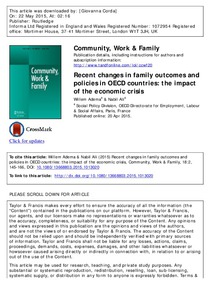Recent changes in family outcomes and policies in OECD countries: the impact of the economic crisis

2015
18
2
145-166
child care ; comparison ; economic recession ; family policy ; household income ; income distribution ; poverty ; statistics ; well being ; women workers
Social protection - Family responsibilities
English
Bibliogr.
"Following decades of progress in prosperity, female employment participation and early childhood education and care policies, the recent economic crisis which began in 2007/2008 has had a negative impact on many aspects of family and child well-being in many OECD countries. Although effects vary across countries, the growth in female employment stalled, as did the rebound in fertility rates, divorce rates went up, while child income poverty increased further. The economic crisis also affected family policy. In many countries, income support policies initially expanded but after the onset of the crisis cutbacks to government spending were often made in view of budgetary pressures. In many countries, financial supports for families are less generous now than they were prior to the crisis. By comparison, parental leave arrangements and childcare supports systems have remained largely unscathed in most OECD countries with some countries actually expanding childcare supports despite the limitations to fiscal space. This paper highlights the changes in important family outcomes and related policies that occurred in OECD countries following the onset of the economic crisis, and demonstrates how countries most affected by the crisis faced significantly worse outcomes for families and children."
Digital
The ETUI is co-funded by the European Union. Views and opinions expressed are however those of the author(s) only and do not necessarily reflect those of the European Union or the ETUI.